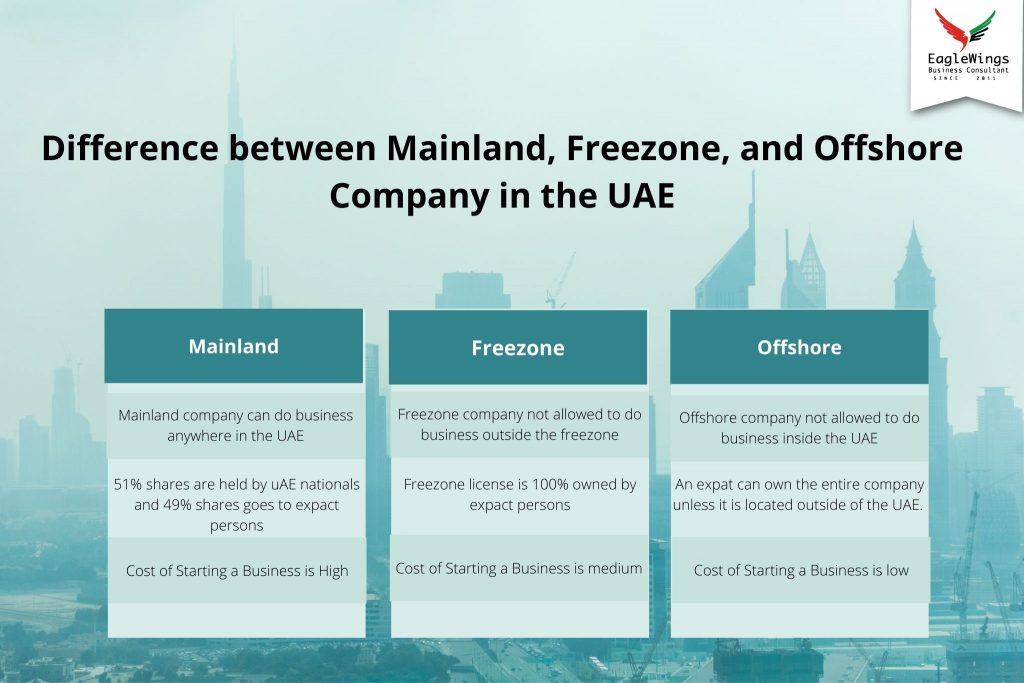How to Start an Ecommerce Business in Shams Free zone?
August 12, 2022Start a Business Setup in Dubai in Simple Steps
August 18, 2022What is The Difference Between Mainland, Freezone and Offshore Company in the UAE?

You must be familiar with the terms mainland, freezone, and offshore company before beginning a business in the United Arab Emirates (UAE). All three jurisdictions have advantages and disadvantages, as well as business prospects for entrepreneurs with various goals.
The type of business entity, the sort of business activity carried out by the organization, and your anticipated trading partners can all influence the priority. With that in mind, let’s first learn some fundamental information about each jurisdiction.
Mainland
An onshore company is another term for the UAE’s mainland. It has a license from the relevant emirate’s Department of Economic Development (DED) and is free to operate both inside and outside the United Arab Emirates.
Freezone
In the UAE, there are more than 40 freezones. It was founded in a certain emirate jurisdiction that grants the company permission to operate in the same freezone. The majority of business owners who wish to minimize their tax burden choose to form a freezone because the authorities there offer a number of advantages and incentives to companies that locate there.
Offshore
An offshore company is one that is formed in another jurisdiction while its parent corporation is located in another. This is not a branch office because no physical office is required.
They do not have a physical presence in the jurisdiction in which they choose to register their offshore business.
You must be aware that turning an offshore company in a free zone into an onshore company is not possible before you start.
Offshore Company has a completely new position, set of legal papers, and set of rules that are relevant. Now let’s examine the distinctions between the three jurisdictions.
Difference between UAE Mainland, Freezone and Offshore Company
Mainland Company
> Ownership: Only 49% of the shares in a firm that an expat starts on the UAE mainland may be purchased. A local sponsor must acquire the remaining 51%.
> Mainland firm in the UAE must have an office with a minimum of 200 square feet.
> Anywhere in the UAE, a company operating on the mainland, is free to conduct business. Any freezone in the emirates is open to them for commerce.
> The mainland companies must prepare an audit at the end of every financial year.
> According to the size of the office or work space, a residence visa is issued.
> Depending on the legal structure of the business, different mainland companies have different minimum capital requirements.
> The general public may inquire about a freezone company’s details.
> Authorities like the DED, Ministry of Labor (MIL), Dubai Municipality, Ministry of Interior (MOI), etc. must grant them authorization.
> Cost of Starting a Business is High.
Freezone Company
> An expat may own 100% of the specific shares. To launch a business, neither a local partner nor a service agent are required.
> A freezone corporation is not required to have office space. These businesses have the option of operating virtually or without an office.
> Business setup typically isn’t permitted to conduct business outside of its freezone, unlike the mainland.
> Audits are not necessary for all FZ companies. However, some types of companies must cope with a required accounting audit. Freezone businesses (FZCO) and free zone establishments are included in this (FZE).
> According to the size of the office or work space, a residence visa is issued.
> Depending on the emirate it is from, a freezone company formation has a minimum capital requirement.
> The details of a freezone company is available to the general public upon request.
> Freezones have their own regulations for the approval of any enterprise operating within their borders, and they don’t call for outside permissions.
> Cost of Starting a Business is medium.
Offshore Company
> An expat can own the entire company unless it is located outside of the UAE. An offshore company is not permitted to have a physical presence in the UAE.
> There can be no physical offices for them in the UAE. They can have it outside the country.
> Unrestricted access to conduct business elsewhere. They are not allowed to conduct business within the UAE.
> Offshore companies are not required to conduct audits. If they wish to stay current financially, they can complete one.
> An offshore firm setup is not given a resident visa because there is no need for an office space.
> There is no minimum capital requirement for an offshore company in the UAE.
> The names and identities of offshore company owners, directors, and shareholders are not made public.
> Offshore formation is available in Ras Al Khaimah (RAK) and the Jebel Ali Free Zone (JAFZA). That jurisdiction’s freezone authorities are in charge of their approval.
> Cost of Starting a Business is low.
The taxation of a free zone and an offshore corporation is comparable. Unlike a free zone, mainland and offshore residents can have bank accounts in the UAE and abroad.
There is no best free zone, offshore, or mainland setup than another; it probably comes down to what is best for your business. As a result, in order to make sound business decisions in the UAE, you must be well-versed in these jurisdictions.
We at Eagle Wings Business Consultant can assist you if you want more information on these jurisdictions or are ready to establish a company in the UAE.
